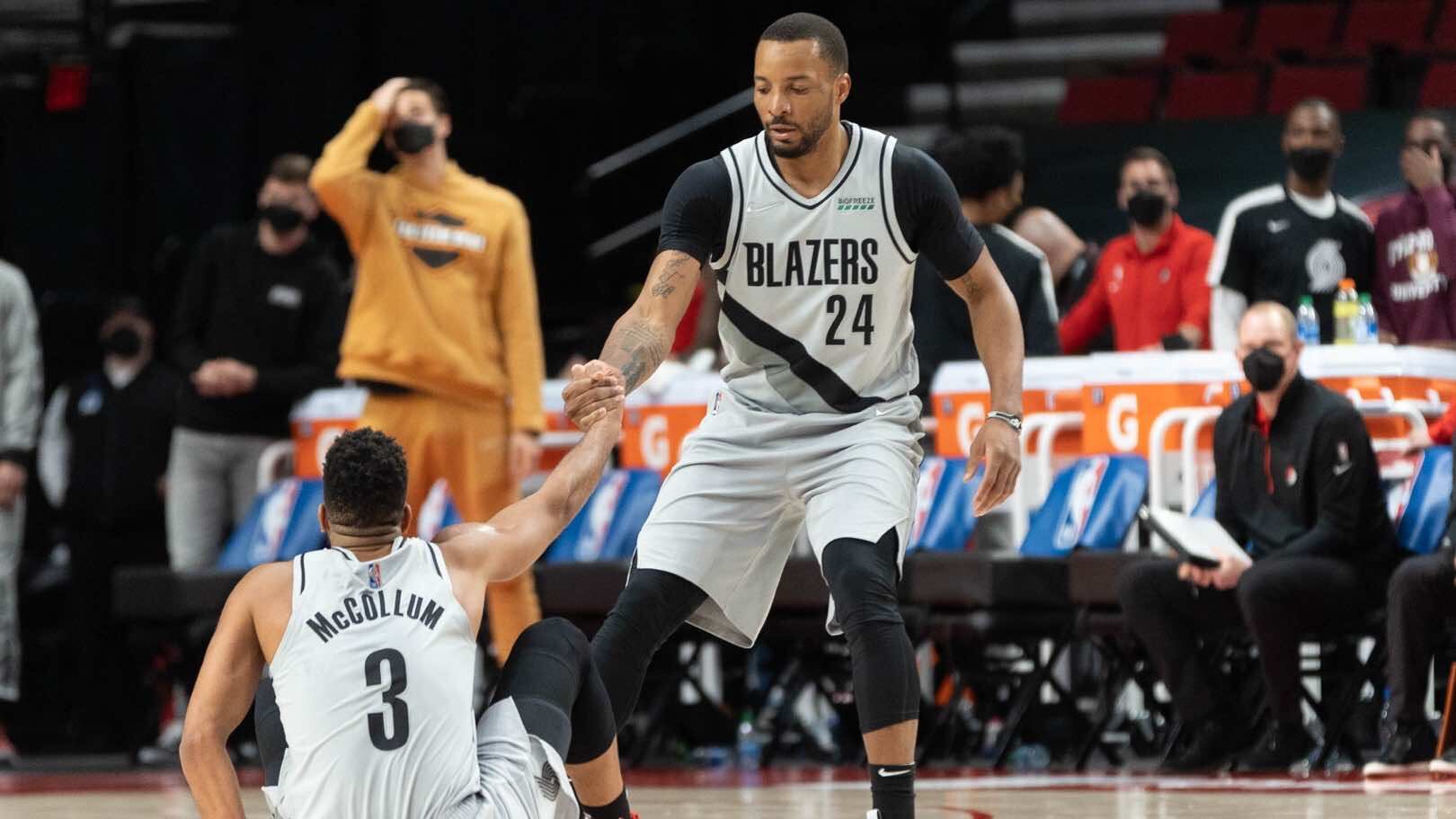Norman Powell’s fast-break layup in the final minute of Friday night’s game gave the Portland Trail Blazers an unexpected win with superstar Damian Lillard out for the evening. In only 11 games with the Blazers, Powell has already proven a major asset to the team.
Yet his arrival underlines why Blazers fans are fretful about the franchise’s long-term outlook.
That’s not Powell’s fault—he’s been as good as advertised. Since being acquired from the Toronto Raptors in a trade-deadline-day deal for Gary Trent Jr. and Rodney Hood, Powell has averaged 17.2 points per game while shooting 38% on 3-pointers.
Powell has been so good that head coach Terry Stotts has decided to start him at small forward alongside Lillard and CJ McCollum. The three-guard lineup is undersized defensively—the trio are all roughly the same size—but it’s hard to argue with nearly 80 points per game. That’s a lot of offensive firepower. Besides, Trent and Hood weren’t exactly defensive stalwarts either.
The problem in the back of everyone’s mind, however, is that Powell probably isn’t rushing to buy Evan Turner’s vacant house. Powell will be an unrestricted free agent this summer, meaning he could sign with any team in the NBA. While playing for the Raptors, there was talk the 27-year-old could have fringe All-Star upside if he continues improving. A player like that is going to demand a lot of money—probably more than $20 million per season. Hanging on to Powell’s services in the long term might be tricky.
Despite the hefty price tag, president of basketball operations Neil Olshey should be highly motivated to retain Powell. The Blazers will certainly be way over the NBA’s salary cap next season. That means they will have no way to acquire a $20 million player on the open market, but—via the arcane rules of the NBA’s collective bargaining agreement—they could offer a huge contract to players that are already on the roster.
Stripped of legalese, the bottom line is this: If Powell walks, there is no feasible way for Olshey to replace him with a comparable player. The Blazers must find a way to retain Powell if they are at all serious about contending for a championship.
This is where things get complicated for Olshey. As much fun as it is to watch Lillard, McCollum and Powell put opposing defenses on roller skates, adding Powell’s contract to the $70 million that McCollum and Lillard are due next season means the Blazers will be paying nearly $100 million to three 6-foot-3 players. The NBA’s salary cap this season is “only” $109 million, for context.
That’s a huge financial burden for three undersized players, and it has to be asked if the team would be better off allocating that money to some frontcourt players who could improve the team’s Swiss cheese defense. And that’s before considering that Powell might not be happy coming back to Portland as the team’s third scoring option.
That leaves Olshey with three options.
First, he could try to sweet-talk Powell into hanging around and bite the bullet on the payroll bill. The Blazers do outscore their opponents by nearly 20 points per 100 possessions with the Lillard-Powell-McCollum triumvirate on the floor, according to nba.com, but the Blazers are only 5-5 in those games. It’s hard to imagine a scenario where this type of status quo decision significantly improves the 6-seed Blazers.
Second, he could try to sign-and-trade Powell to another team to avoid the scenario where Powell leaves for nothing. These types of deals, however, are rare in the NBA—it requires two teams and a player to all agree on both the terms of the trade and the terms of the new contract.
Lastly, Olshey could sign Powell and also trade McCollum for some kind of frontcourt reinforcement that better balances the Blazers’ roster. CJ’s contract runs for another three seasons, and he is having the best year of his career. Crucially, he’s attempting nearly 10 3-pointers per game, a major skill in the analytics era of the NBA.
The Blazers have been hesitant to even entertain the idea of trading CJ. He’s one of Olshey’s prize draft picks and, in the past, Olshey hasn’t been fond of dealing “his guys.” The fiercely loyal Lillard has said repeatedly he believes he can compete for a title with McCollum as a sidekick. Rip City denizens won’t be happy with the fact that a McCollum trade is more likely to net Tobias Harris than Ben Simmons.
But the bottom line is that the team has been unceremoniously destroyed by superior playoff teams for five consecutive seasons and looks to be headed for the same fate this season. It’s going to take more than a coaching change to get this team over the hump. Something has to change.
For better or worse, Norman Powell’s arrival in Portland may mean that “something” is parting ways with McCollum. The alternative options—letting Powell walk for nothing or continuing to start three defensively deficient guards—aren’t going to bring a banner to the Rose Garden.

